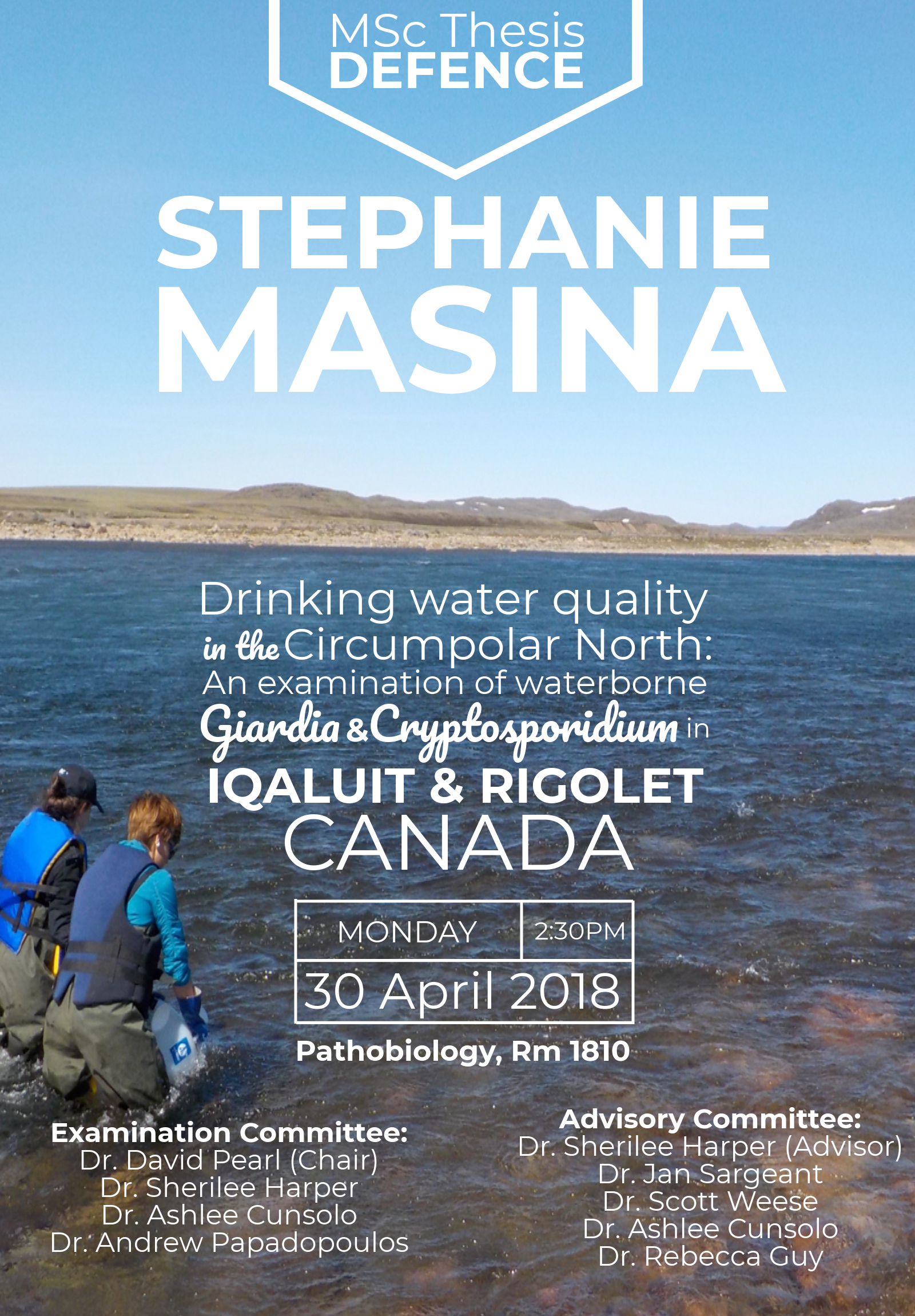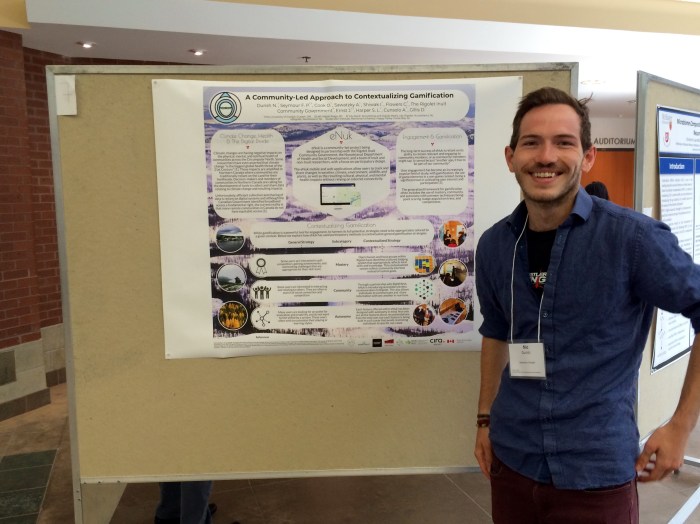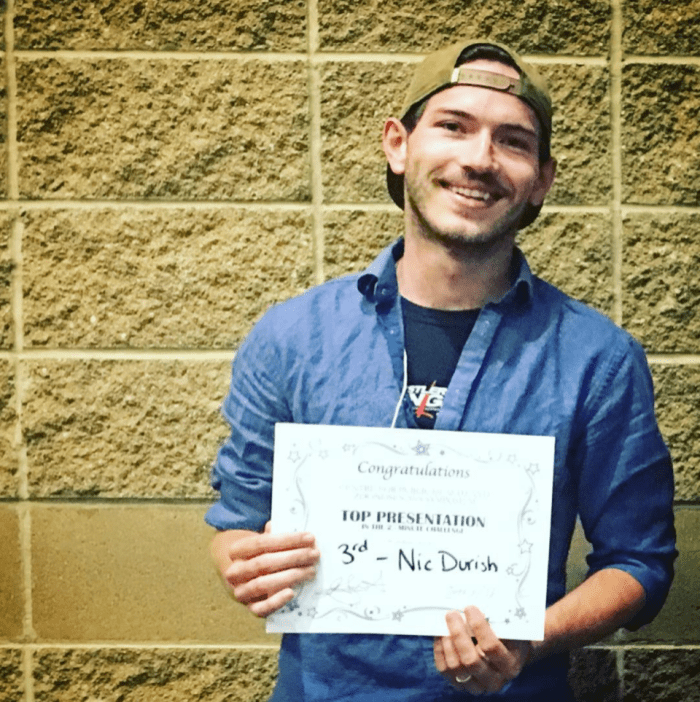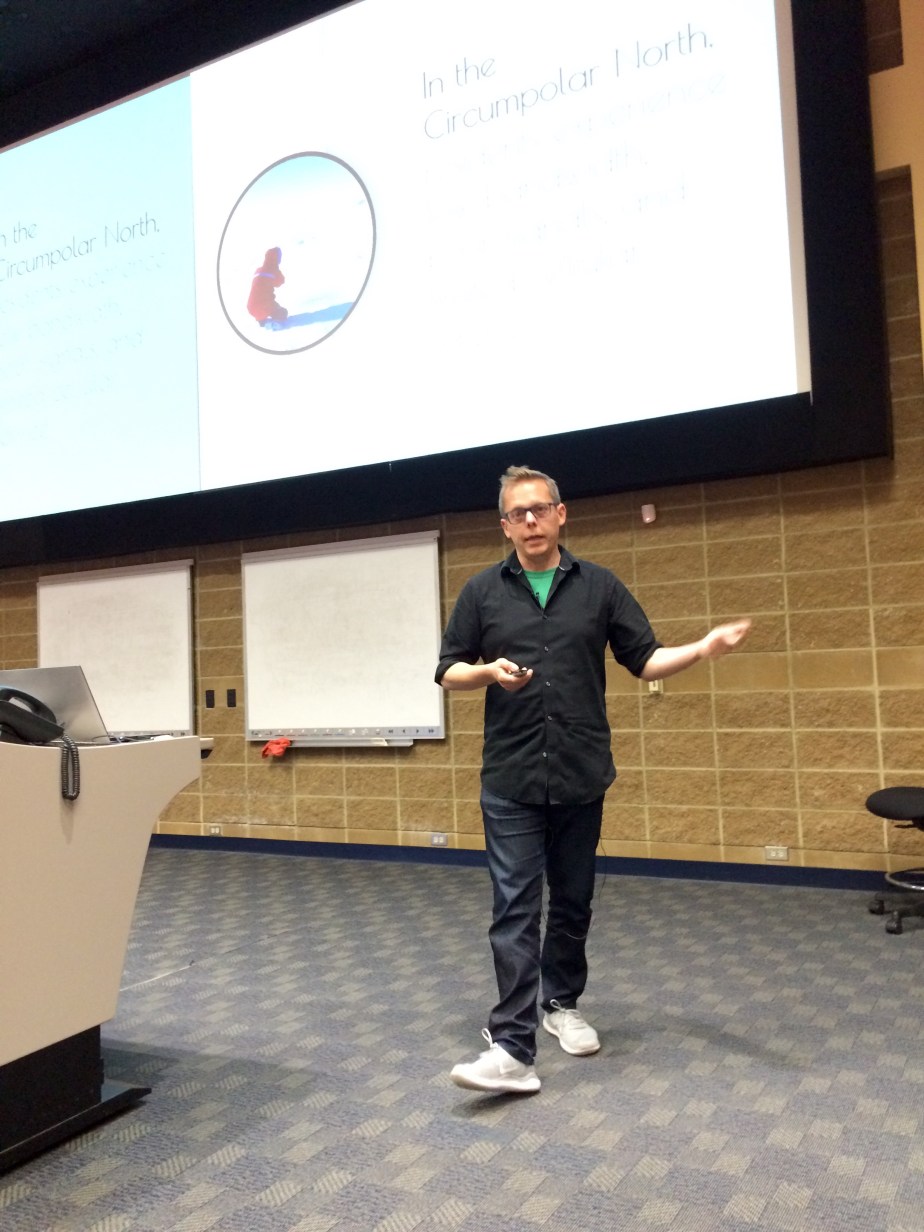New Publication: Wastewater treatment and enteric illness in the Arctic
The article is freely available for 50 days: Anyone clicking on this link before February 03, 2019 will be taken directly to the final version of this article: https://authors.elsevier.com/c/1YE0uB8ccghTq
Citation:
Daley, K., Jamieson, R., Rainham, D., Hansen, L. T., Harper, S. L. (2018). Screening-level microbial risk assessment of acute gastrointestinal illness attributable to wastewater treatment systems in Nunavut, Canada. Science of the Total Environment. 657(20): 1253-1264.
Abstract:
Most arctic communities use primary wastewater treatment systems that are capable of only low levels of pathogen removal. Effluent potentially containing fecally derived microorganisms is released into wetlands and marine waters that may simultaneously serve as recreation or food harvesting locations for local populations. The purpose of this study is to provide the first estimates of acute gastrointestinal illness (AGI) attributable to wastewater treatment systems in Arctic Canada. A screening-level, point estimate quantitative microbial risk assessment model was developed to evaluate worst-case scenarios across an array of exposure pathways in five case study locations. A high annual AGI incidence rate of 5.0 cases per person is estimated in Pangnirtung, where a mechanical treatment plant discharges directly to marine waters, with all cases occurring during low tide conditions. The probability of AGI per person per single exposure during this period ranges between 1.0 × 10−1 (shore recreation) and 6.0 × 10−1 (shellfish consumption). A moderate incidence rate of 1.2 episodes of AGI per person is estimated in Naujaat, where a treatment system consisting of a pond and tundra wetland is used, with the majority of cases occurring during spring. The pathway with the highest individual probability of AGI per single exposure event is wetland travel at 6.0 × 10−1. All other risk probabilities per single exposure are <1.0 × 10−1. The AGI incidence rates estimated for the other three case study locations are <0.1. These findings suggest that wastewater treatment sites may be contributing to elevated rates of AGI in some arctic Canadian communities. Absolute risk values, however, should be weighed with caution based on the exploratory nature of this study design. These results can be used to inform future risk assessment and epidemiological research as well as support public health and sanitation decisions in the region.
How can understanding hospital admission patterns inform climate change adaptation for the healthcare sector in Uganda? Read more to find out!
Kate Bishop-Williams and co-authors recently published an article in the International Journal of Environmental Research and Public Health. The article explored how understanding hospital admission patterns can promote climate change adaptation. Through this article, we illustrate how analyzing hospital data alongside meteorological parameters may inform climate-health planning in low-resource contexts.
David Borish Wins a SSHRC Doctoral Scholarship!
Sincerest congratulations to David Borish for winning a very prestigious SSHRC Doctoral Scholarship (Joseph-Armand Bombardier Canada Graduate Scholarship). Learn more about David's work: Click here to read David's research bio; and Click here to see David's website.
How do non-climatic factors reinforce maladaptation trajectories? Check out this new publication to find out.
Congratulations to Dr. Carol Zaveleta for her recent publication in PLoS One. Her participatory, community-based study was conducted in collaboration with Shawi communities. Together, they worked to characterize the food system of the Shawi in the Peruvian Amazon, climatic and non-climatic drivers of their food security vulnerability to climate change, and identify potential maladaptation trajectories. They found that transformational food security adaptation should include consideration of Indigenous perceptions and priorities, and should be part of Peruvian food and socioeconomic development policies. Click here for free article (open access).
Citation:
Zavaleta, C., Berrang-Ford, L., Ford, J., Llanos-Cuentas, A., Carcamo, C., Ross, N., Lancha, G., Sherman, M., Harper, S.L., IHACC Research Team. (2018) Multiple non-climatic drivers of food insecurity reinforce climate change maladaptation trajectories among Peruvian Indigenous Shawi in the Amazon. PLoS ONE 13(10): e0205714. Click here for free article (open access).
Abstract:
Background: Climate change is affecting food systems globally, with implications for food security, nutrition, and the health of human populations. There are limited data characterizing the current and future consequences of climate change on local food security for populations already experiencing poor nutritional indicators. Indigenous Amazonian populations have a high reported prevalence of nutritional deficiencies. This paper characterizes the food system of the Shawi of the Peruvian Amazon, climatic and non-climatic drivers of their food security vulnerability to climate change, and identifies potential maladaptation trajectories.
Methods and findings: Semi-structured interviews with key informants (n = 24), three photovoice workshops (n = 17 individuals), transect walks (n = 2), a food calendar exercise, and two community dissemination meetings (n = 30 individuals), were conducted within two Shawi communities in Balsapuerto District in the Peruvian Loreto region between June and September of 2014. The Shawi food system was based on three main food sub-systems (forest, farming and externally-sourced). Shawi reported collective, gendered, and emotional notions related to their food system activities. Climatic and non-climatic drivers of food security vulnerability among Shawi participants acted at proximal and distal levels, and mutually reinforced key maladaptation trajectories, including: 1) a growing population and natural resource degradation coupled with limited opportunities to increase incomes, and 2) a desire for education and deforestation reinforced by governmental social and food interventions.
Conclusion: A series of maladaptive trajectories have the potential to increase social and nutritional inequities for the Shawi. Transformational food security adaptation should include consideration of Indigenous perceptions and priorities, and should be part of Peruvian food and socioeconomic development policies.
PhD position in participatory climate modeling, ethnoclimatology, and human health in the Arctic
Looking for a great PhD research project with an interdisciplinary research team? Apply today! Position is co-supervised by James Ford (Leeds University) and Sherilee Harper (University of Alberta). The position is primarily based in the UK.
Apply by 31 October 2018.
For more details:
New Video: David Summarizes his National Geographic Student Expedition in Alaska
Check out this video, entitled "Clap", created by David Borish (PhD student), that summarizes his National Geographic Student Expedition in Alaska.
David leads a National Geographic Student Expedition in Alaska
Written by David Borish, PhD Student Over the past two weeks I was incredibly fortunate to co-lead a National Geographic Student Expeditions (NGSE) trip in Alaska. NGSE offers photo and video-oriented programs for High School and Middle School students worldwide. Hired as the video-focused trip leader, my role was to provide guidance and support to six students from various parts of the US and China who were interested in producing some form of video for their final “on assignment” project.
I wore many hats during my time in Alaska. I planned day activities, organized events, facilitated a positive environment for all levels of learning, drove over 1,500kms, cooked, listened when students needed someone to talk to, dealt with both positive and negative group dynamics, and, most importantly, became a friend and mentor to some amazing, smart, and passionate youth.
Simply put, the trip was a blast. We hiked in Denali National Park, went on an Arctic wildlife safari, ice climbed, trekked on the Matanuska Glacier, kayaked in Kachemak Bay, went tide pooling, interacted with a National Geographic wildlife-tracking expert, and visited the Alaska Native Heritage Center, among other things.
Relating to my personal PhD research, I had an opportunity to see and photograph Alaskan caribou in Denali National Park. I also received some insight into the diverse connections between caribou and Alaskan Natives across the state, from Inupiat to Aleut. I hope to learn more about these connections in Alaska as they can inform my research moving forward.
Photo credits: David Borish
Defense! Anna Manore
Computer Science Meets Public Health: 2018 CPHAZ Symposium
Written by Isaac Bell The Centre for Public Health and Zoonoses (CPHAZ) held their 2018 symposium in Rozanski Hall at the University of Guelph this past Friday (June 8th). The keynote speaker at the symposium was Dr. Craig Stephen, a professor at the University of Saskatchewan and executive director of the Canadian Wildlife Health Cooperative. Harper Lab collaborators Dr. Dan Gillis and MSc student Nic Durish, from the school of computer science, were also featured presenters.
Dr. Stephen’s talk, entitled ‘Can OneHealth Save the World?’,set the tone for the day’s agenda, with themes of systems-thinking and transdisciplinarity continuously emerging across a range of topics. He challenged us to reconsider our perceptions of health by emphasizing the interplay of humans and the so-called natural environment. For instance, should the health of a salmon population be defined as simply having enough fish for humans to kill at a steady rate? Salmon provide numerous ecosystem services - the effects of which undoubtedly benefit humans - so ascribing a definition of health based on short-term economic returns may prove harmful in the not-so-long term.
In the following session, Dr. Gillis spoke to the ‘Potential Health Aspects of the Digital Divide’. Focusing on Rigolet, an Inuit community in Nunatsiavut, Labrador, Gillis highlighted how dialup-level internet speeds and the absence of cellphone service can serve as a barrier to accessing information, collecting data, and addressing health concerns. Rigolet is representative of much of Inuit Nunangat in this respect, where the digital divide is yet another aspect in which primarily Indigenous communities face continued disparities when compared to national standards. In response, Gillis’ research is undertaking a two-step approach: the first step is to quantify the extent of the digital divide using strategically placed Raspberry Pi’s (essentially mini computers) to measure upload and download speeds. The second step is to connect Northern communities to the internet using a technology called RightMesh (www.rightmesh.io). An immediate benefit of this initiative would be, for example, the ability for residents to deposit cheques via their mobile phones, as opposed to paying a deposit fee at the local grocery store.
Nic Durish, a masters student with Dr. Gillis, presented a poster on ‘A Community-Led Approach to Contextualizing Gamification’. This work is centered around the eNuk program (www.enuk.eco), whose “mobile and web applications allow users to track and share changes in weather, climate, environment, wildlife, and plants, as well as the resulting cultural, physical, and mental health impacts”[1]. eNuk, while still in the development phase, is being piloted in Rigolet led by local researchers Inez Shiwak and Charlie Flowers, alongside Ashlee Cunsolo, Sherilee Harper, and Dan Gillis, and its usage will be facilitated by the RightMesh network. After the lunch break, Nic participated in the 2-minute student challenge, and delivered an excellent speech to win third place (and $100!) out of all the contestants. Congrats to Nic and Dr. Gillis, and thanks to the CPHAZ organizers for administering yet another successful symposium!
To view all of the conference presentations, click here.
References:
[1]Durish, N. et al. A Community-Led Approach to Contextualizing Gamification. Poster presented at: 3rd CPHAZ Symposium; 2018 Jun 8; Guelph, Ontario.
America Adapts! The Climate Change Podcast
Congratulations to Kate Bishop Williams, PhD Candidate, for her recent interview on the America Adapts, the Climate Change Podcast.
Listen to the podcast by clicking here!
In this episode, Kate talks about how she used an America Adapts episode, “Deconstructing a Climate Change Skeptic” as part of her class curricula at the University of Waterloo. Specifically, in this interview, "Kate discusses why she chose this episode to use a tool to teach her students effective climate communication."
Kate touches on the following topics in her interview:
Using podcasts in the classroom to promote environmental change;
Learning that climate skepticism is more prevalent than many realize;
Developing guidelines for listening to a podcast and talking climate change;
Understanding the role of open access educational materials, especially climate resources;
Students explain how listening to a climate skeptic enhanced their ability to communicate climate change.
New Publication Exploring the Hidden Costs of Enteric Illness in the North
Congratulations to Nia King for her recent publication in PloS One. In the north, per capita healthcare costs are high. However, given Inuit communities’ unique cultural, economic, and geographic contexts, there is a knowledge gap regarding the context-specific indirect healthcare costs borne by Inuit. Therefore, Nia worked with Northern partners to identify the major indirect costs of enteric illness, and explore factors associated with these indirect costs, in Rigolet, Canada.
Citation:
King, N., Vriezen, R., Edge, V.L., Ford, J., Wood, M., IHACC Research Team, Harper, S.L. (2018). The hidden costs: Identification of indirect costs associated with acute gastrointestinal illness in an Inuit community. PloS One, 13(5), e0196990. Click here for free article (open access).
Abstract:
Background: Acute gastrointestinal illness (AGI) incidence and per-capita healthcare expenditures are higher in some Inuit communities as compared to elsewhere in Canada. Consequently, there is a demand for strategies that will reduce the individual-level costs of AGI; this will require a comprehensive understanding of the economic costs of AGI. However, given Inuit communities’ unique cultural, economic, and geographic contexts, there is a knowledge gap regarding the context-specific indirect costs of AGI borne by Inuit community members. This study aimed to identify the major indirect costs of AGI, and explore factors associated with these indirect costs, in the Inuit community of Rigolet, Canada, in order to develop a case-based context-specific study framework that can be used to evaluate these costs.
Methods: A mixed methods study design and community-based methods were used. Qualitative in-depth, group, and case interviews were analyzed using thematic analysis to identify and describe indirect costs of AGI specific to Rigolet. Data from two quantitative cross-sectional retrospective surveys were analyzed using univariable regression models to examine potential associations between predictor variables and the indirect costs.
Results/Significance: The most notable indirect costs of AGI that should be incorporated into cost-of-illness evaluations were the tangible costs related to missing paid employment and subsistence activities, as well as the intangible costs associated with missing community and cultural events. Seasonal cost variations should also be considered. This study was intended to inform cost-of-illness studies conducted in Rigolet and other similar research settings. These results contribute to a better understanding of the economic impacts of AGI on Rigolet residents, which could be used to help identify priority areas and resource allocation for public health policies and programs.
Congratulations to Lab Members Pursuing Medical Careers!
New Publication! Examining adaptation projects targeting food systems funded by United Nations Framework Convention on Climate Change (UNFCCC)
Congratulations to Aleksandra, member of James Ford's Climate Change Adaptation Research Group, for her new publication in Climate Policy. In her article, Aleksandra documents and examines adaptation projects targeting food systems financed through funding bodies of the United Nations Framework Convention on Climate Change (UNFCCC). Based on her results, Aleksandra recommends that projects should assess the entire food system to ensure future food security.
Citation:
Conevska, A., Ford, J., Lesnikowski, A. and Harper, S.L., 2018. Adaptation financing for projects focused on food systems through the UNFCCC. Climate Policy, https://doi.org/10.1080/14693062.2018.1466682
Abstract:
Investments in adaptation are required to reduce vulnerability and strengthen the resilience of food systems to the impacts of climate change. For low-income nations, international financing plays a central role in supporting adaptation. In this article, we document and examine adaptation projects targeting food systems financed through funding bodies of the United Nations Framework Convention on Climate Change (UNFCCC). We find that between 2004 and 2015, 3% (n = 96) of adaptation projects supported through the UNFCCC explicitly focused on the production, processing, distribution, preparation and/or consumption of food, with US$546 m mobilized through funding bodies directly and US$1.44bn through co-financing. Agriculture is the most common sector supported, with extreme weather events the primary climate change-related impact motivating nations to apply for adaptation financing. The majority of actions are documented to adapt the food production component of food systems, with limited focus within projects on the full range of food system vulnerability and the implications on food security.
Key policy insights:
-
Enhanced international adaptation financing targeting food systems is needed, and in particular financing to address limited adaptation readiness
-
Supported food system projects should include holistic assessments of the entire food system in order to prioritize sector and food system component issue areas for short- and long-term efficiency
-
To better analyse food system linkages and aid in the prioritization of adaptation activities, adaptation-directed funds should consider placing a higher emphasis on a cross-sectoral approach within projects
-
Linkages between official development assistance and adaptation-directed funds could help optimize financing for food systems and mainstream food system adaptation efforts
https://twitter.com/Climate_Policy/status/996301700569985024
New Publication! Understanding source water protection in Indigenous communities
Congratulations to Rachael Marshall for her new publication in the Journal of Hydrology. The implementation of source water protection programs is relatively recent in Canada and the United States. Although protecting water at the watershed scale has been a focus of many of these programs, few Indigenous communities located within these watersheds are involved in the process. Therefore, we wanted to examine and map the extent, range, and nature of the published peer-reviewed literature on the adoption, implementation, and outcomes of source water protection programs involving Indigenous populations in Canada and the United States.
Rachael Marshal led the paper; she is a PhD Candidate in Environmental Engineering at the University of Guelph. She has worked in partnership with Indigenous communities in Guatemala, Nunatsiavut, northern and southern Ontario, and Saskatchewan to promote clean drinking water, appropriate water infrastructure, and healthy socio-ecological systems.
Citation:
Marshall, R., Levison, J., McBean, E., Brown, E., Harper, S.L. 2018. Source water protection programs and Indigenous communities in Canada and the United States: a scoping review. Journal of Hydrology. https://doi.org/10.1016/j.jhydrol.2018.04.070
Abstract:
The implementation of source water protection programs is relatively recent in Canada and the United States. Although protecting water at the watershed scale has been a focus of many of these programs, few Indigenous communities located within these watersheds are involved in the process. The purpose of this scoping review was to examine and map the extent, range, and nature of the published peer-reviewed literature on the adoption, implementation, and outcomes of source water protection programs involving Indigenous populations in Canada and the United States. This review followed a systematic process to identify and evaluate the literature. Searches were conducted in three aggregator databases (Web of Science™, ProQuest®, and GreenFILE™). Two independent reviewers conducted a systematic two-stage screening process using inclusion and exclusion criteria in the software DistillerSR©. Articles that met inclusion criteria were analyzed using thematic qualitative and descriptive quantitative methods. The findings indicate that: a) there is a lack of peer-reviewed studies focusing on the ecological outcomes of source water protection programs that are inclusive of Indigenous populations in Canada and the United States; b) the depth to which the literature describes Indigenous involvement in source water protection programs is minimal; and c) Indigenous involvement in source water protection programs is generally not reported as substantial. This review provides several recommendations to improve both the peer-reviewed literature on the topic and source water protection programs. There is a need to improve reporting in the literature on quantitative program results, the nature of Indigenous involvement in source water protection programs, and Indigenous-inclusive inter-jurisdictional success stories. It is also recommended that source water protection programs recognize Indigenous peoples as more than stakeholders groups, and that future studies pull from innovations in other fields to address complex problems and provide new insights to the field of source water protection. The methodology presented in this paper provides a template for researchers in engineering and environmental fields, such as hydrology, to identify and review published literature in a systematic, transparent, and rigorous manner.
Defence! Stephanie Masina

Article about climate change, affect, and emotional health listed as "critical content" and is now freely available
In celebration of its 10th year of publication, the journal Emotion, Space and Society has selected 15 articles that "showcase some of the most diverse and critical content that the journal has published since it launched in 2008." These selected articles will be freely available from March to May 2018. The following article was selected as one of the top 15 articles published by the journal and is now freely available online:
Cunsolo Willox, A., Harper, S.L., Edge, V., Landman, K., Houle, K., Ford, J., the My Word Team, and Rigolet Inuit Community Government. 2013. ‘The Land Enriches the Soul:’ On climatic and environmental change, affect, and emotional health and well-being in Rigolet, Nunatsiavut, Canada. Emotion, Space, and Society, 6(1): 14–24. Click here to access the article for free.
Congratulations Marta!
Sincerest congratulations to undergraduate student Marta Thorpe, who was recently accepted to the Doctor of Dental Surgery (DDS) program, Faculty of Dentistry at the University of Toronto!
Marta has been examining the range and extent of community-based research methods used in Arctic sciences. Marta will begin her new program at the University of Toronto this fall semester.
Congratulation Marta!
Crystal Gong awarded Guelph Y 2018 Women of Distinction
Congratulations to Undergraduate Thesis Student Crystal Gong, who is one of the honorees being recognized by the Guelph Y 2018 Guelph Women of Distinction. Crystal is working on our research team on two research projects: (1) synthesizing the state of knowledge on food security in the context of climate change, and (2) examining how season is associated with food security.
Read more about Crystal's award:
Evaluating the strengths, challenges, and opportunities of health-related community-based adaptation research
Article Highlights
- We examine the application of Community Based Adaptation (CBA) approaches in Indigenous community settings.
- CBA can co-generate knowledge on climate-health vulnerability and adaptation options, build capacity, and inform decision choices.
- CBA can also have unintended negative consequences.
- CBA requires careful consideration of community-researcher relationships and meaningful engagement of knowledge users.
- CBA holds significant promise but only in the ‘right’ circumstances.
Abstract
Climate change presents substantial risks to the health of Indigenous peoples. Research is needed to inform health policy and practice for managing risks, with community based adaptation (CBA) emerging as one approach to conducting research to support such efforts. Few, if any, studies however, have critically examined the application of CBA in a health or Indigenous peoples context. We examine the strengths, challenges, and opportunities of health-related CBA research in Indigenous community settings, drawing on the experiences of the multi-nation interdisciplinary Indigenous Health Adaptation to Climate Change (IHACC) project. Data collection was guided by a framework developed to evaluate CBA projects. Semi-structured interviews (n = 114) and focus groups (n = 23, 177 participants) were conducted with faculty-based researchers, institutional partners, community members, students, and trainees involved in the IHACC project in Canada, Uganda, and Peru. Results illustrate the importance of CBA in co-generating knowledge on climate-health vulnerability and adaptation options, capacity building, and informing decision choices. There are also significant challenges of conducting CBA which can have unintended negative consequences, with results emphasizing the importance of managing the tension between health research and tangible and immediate benefits; developing a working architecture for collective impact, including team building, identification of common goals, and meaningful engagement of knowledge users; and the need to continuously monitor and evaluate progress. CBA holds significant promise in a health adaptation context, but only in the ‘right’ circumstances, where considerable time is spent developing the work with partners.
Article Citation
Ford, J.D., Sherman, M., Berrang-Ford, L., Llanos, A., Carcamo, C., Harper, S.L., Lwasa, S., Namanya, D.B., Marcello, T., Maillet, M., Edge, V. 2018. Preparing for the health impacts of climate change in Indigenous communities: The role of community-based adaptation. Global Environmental Change. 49: 129–139. Click here for open-access article.






















